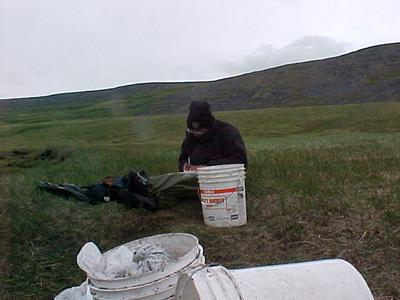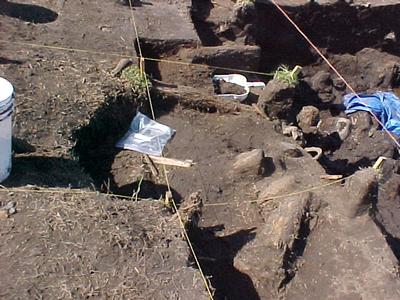26 July, 2001
Screening was the name of the game today. There are over 50 bags of soil
that has to be screened. I feel like the old miners searching for gold. We
are searching for the usual artifacts, bones (fauna), lithic (blade
parts), and ceramics. The water is cold as we sift through the soil. But
we have to go over carefully because there is a great deal to find. We do
not want to miss anything. We have been finding mostly bones. I did find
an arrowhead and some worked ivory today Wesley found a few ivory pieces.
If I have any doubt about an object I ask Wesley. Because he has grown up
in Wales he knows a great deal about the animals that are hunted (so does
Marie).
We didn't have to worry about the weather today, it rained, was very cold,
and very windy. We thought we saw some snow in the air and I thought it
sleeted for awhile. The excavations and screening ends tomorrow at noon. WE
have to be finished because we have to catalog everything, and box it for
shipping back to Anchorage on Saturday.
I met a very interesting person back in March, Herbert Anungazuk. He now
lives in Anchorage, but is from Wales. I am really glad I had a chance to
talk to Herbert here in Wales. He works for the National Park Service and
is a Native liaison and heritage specialist for cultural resources.
Herbert has done a great deal with oral histories and traditions for
Wales. When he was living in Wales he was a whaling captain. He was in
charge of the registered crews that can go out to hunt a whale. When a
crew hunts a whale it takes a tremendous effort to get the whale, and then
bring it in to shore. Upon arriving to shore many people share in the
whale. Every year in New Bedford, Massachusetts, there is a reading of
Moby Dick. Many people take part-reading portion of the book. Herbert has
read before and is scheduled to read again this year. Last year he read his
portion in Inupiaq. I could feel his enthusiasm and love for his village
and people as he spoke. It is vital to keep ones history, heritage, and
traditions.
Wales is a village that lives on subsistence. This means they hunt for
their food. The people in Wales hunt caribou, reindeer, moose, seal,
walrus, and hopefully a whale during the year.
Their lives are very dependent on the weather. It is severe during much of
the year, being in the Arctic region, and being on the Bering Strait.
There are three strong currents in the Bering Sea. The people have to know
these currents; their lives are dependent on them.
Wales is a remarkable village viewing the lives of the people here. It is
one of the friendliest places I ever been. It is small village
(approximately 140 people). We have been offered numerous rides or help
carrying things, such as our seven and eight gallon containers of water
across the village. People know who we are by name. We a have only been
here a month yet we have fit into this society.

Marie is pictured here writing up tagefor all of our findings in the screening.

Here is one of our units to be worked on.
Contact the TEA in the field at
.
If you cannot connect through your browser, copy the
TEA's e-mail address in the "To:" line of
your favorite e-mail package.
|
